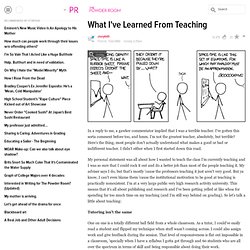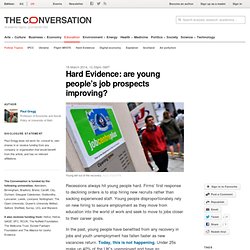

What I've Learned From Teaching. I'm surprised to see you say that evals don't matter.

I wonder if this depends on your field or maybe it's the school? I know that my friends in the humanities jump through all sorts of hoops and walk on eggshells to avoid bad evals. It's the school and the department . Like my evals matter in that if they were all awful, I'd get shuffled off into only teaching recitations/labs, but so long as they're better than mediocore, it doesn't matter by how much better. It's basically cause I'm assigned these required courses that are always gonna have students taking them, and seeing my name on the course is probably not gonna dissuade anyone, and again that whole my chair takes it with a cup of salt. one of my friends teaches college math- her evals have the questions, and an "other" fill in category where it's blank.
Yep my school has an other catagory, and so I'm gonna guess it's standardish. that makes total sense. Hard Evidence: are young people's job prospects improving? Recessions always hit young people hard.

Firms’ first response to declining orders is to stop hiring new recruits rather than sacking experienced staff. Young people disproportionately rely on new hiring to secure employment as they move from education into the world of work and seek to move to jobs closer to their career goals. In the past, young people have benefited from any recovery in jobs and youth unemployment has fallen faster as new vacancies return. Today, this is not happening. Under 25s make up 40% of the UK’s unemployed and have an unemployment rate nearly four times that of older workers.
Click to enlarge But the strong jobs recovery of the past two years has seen little increase in employment among young people, with just 40,000 of the 1 million jobs created going to the young. Compulsory participation The response falls into three broad areas. So far, however, this has not led to improved transitions into work and reduced unemployment among those aged 18 to 24.
Student Experience. Structures & Schools. Content. Our Daily Bleg: How Should a Professor Incentivize Classroom Attendance? (Digital Vision) Art Wright, a professor*, writes in to say: I have this problem: I am course-planning for the fall term right now, and I’m trying to figure out the best way to develop an attendance policy.

Many professors deduct points or letter grades for a certain number of absences. In contrast, I had someone recommend that I give points if students come to most or all of the class meetings. So I’m left wondering: What is the best way to incentivize class attendance for my students? What advice do you have for Art? If you’re a professor, let us know what you’ve tried that has worked or failed.
*By the way, Art is a visiting professor of New Testament at the Baptist Theological Seminary at Richmond. Six Communication Tricks That Will Get Your Kids to Cooperate. «Silver économie»: la vieillesse va-t-elle sauver la croissance? Pour qu’un client consomme plus, il faut plus le solliciter, qu’il soit jeune ou vieux.

Aussi, lorsqu’on regarde du côté des seniors, certains voient des bas de laine qu’il serait criminel d’ignorer en période de crise. Et si, après avoir été considérée comme un coût pour la collectivité, la vieillesse se transformait en relais de croissance? Avec son collègue du Redressement productif Arnaud Montebourg, la ministre déléguée chargée des Personnes âgées et de l’autonomie, Michèle Delaunay, qui estimait lors d'une récente rencontre avec la presse que le pouvoir d'achat des seniors «peut être à l’origine de 0,25 point de croissance par an», multiplie donc les initiatives.
Sa cible: les personnes de plus de 60 ans qui, selon l’Insee, représentent aujourd’hui 23,4% de la population —près d’un Français sur quatre, presqu’autant que les moins de 20 ans—, et encore plus particulièrement, les personnes de 75 ans et plus, soit 9% des Français. publicité Des «gérontechnologies» au « géronmarketing»?